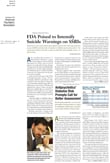New York state advocates for mentally ill inmates are challenging the use of special housing units (SHUs), a form of solitary confinement in the state prison system.
They have the support of Assemblyman Jeffrion Aubry (D-Queens), who introduced a bill (A 8849) that would make it illegal to place persons with psychiatric disabilities in SHUs and would create alternative therapeutic housing areas for these individuals.
Robert Corliss, associate director for criminal justice for NAMI-New York State, said, “Assemblyman Aubry’s bill has provided fresh momentum for galvanizing the different advocacy groups, some of which have worked on this issue for years,” according to the February 5 Albany Times Union.
A press release from organizations supporting the proposed legislation points out that prisoners in SHUs “spend 23 to 24 hours a day in a barren concrete cell experiencing sensory deprivation, social isolation, and enforced idleness. . . .”
The release goes on to claim that the state’s Department of Correctional Services houses nearly 5,000 prisoners in solitary confinement, which is 8 percent of the total inmate population, a percentage that is four times the national average.
The state’s Department of Correctional Services claims that the 23-hour daily confinements have reduced assaults on inmates and prison guards.
At a press conference on January 27 in support of the legislation, Leah Gitter, a family member of a person with a psychiatric disability, told the group, “There is no way to express the misery and suffering produced by SHU confinement. I equate it with visiting a prisoner of war.”
Between 1998 and 2002, more than half of the 48 suicides in the state prison system occurred while the inmate was in solitary confinement, according to the press release.
In October 2003, Human Rights Watch issued a 215-page document, “Ill-Equipped: U.S. Prisons and Offenders with Mental Illness,” that cited data from APA’s 2000 report “Psychiatric Services in Jails and Prisons.” These data indicated that “perhaps as many as 1 in 5 prisoners was seriously mentally ill, with up to 5 percent actively psychotic at any given moment” (Psychiatric News, December 5, 2003).
In its report, Human Rights Watch recommended that prisons “exclude the seriously mentally ill from segregated confinement or ‘supermax’ prisons.”
Sharon E. Carpinello, R.N., Ph.D., acting commissioner of the New York State Office of Mental Health, testified before state legislature budget committee on February 4 that the proposed budget for mental health includes $7 million in new funds that would help provide mental health services to inmates in SHUs and would also establish two behavioral-health units to serve as placement alternatives.
A news release from a coalition of organizations supporting the legislation is posted online at www.nyaprs.org/enews/show_enews.php?id=1144. ▪
